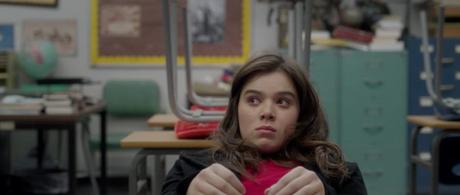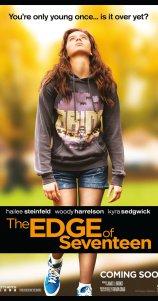
There is a sequence in writer-director Kelly Fremon Craig's wonderful debut film The Edge of Seventeen where the lead character played by Hailee Steinfeld rails against her own generation, decrying her peers' chronic cell phone dependency and social media obsession. "I'm an old soul," Steinfeld tells us, before detailing how she loves old movies and prefers talking to older people rather than people her own age. We're not meant to completely believe her, not when we've already glimpsed her cyberstalking a cute boy from her school she's too nervous to talk to and not when the film repeatedly challenges all of her assumptions (e.g., her older brother's life isn't quite the cake walk she so enviously believes it to be).

In other word, she's a teenager, the type of character many actual teenagers could likely relate to. Such a shame, then, that accompanying parent or adult guardian. Edge of Seventeen has turned into a box office flop, exiting the top 10 after just 3 weeks and a meager domestic gross of $12.7 million, well short of the break-even point based on the $9 million production budget. The specific reason for this financial failure is likely due to timining, specifically that releasing a coming of age high school comedy at this time of the year does not make sense. Moreover, with its R-Rating Edge of Seventeen is technically forbidden viewing for anyone under the age of 17 without an
This was one of the themes of the after-movie conversation I had with fellow WeMinoredInFilm writer Julianne, whose well-earned praise for Edge of Seventeen was followed by, "I'm sorry it's not doing better." We mutually mused that they don't exactly make movies like Edge of Seventeen anymore, insightful, heartfelt looks at the teenage experience in America. Of course, that's just factually wrong. These movies still get made (look at last year's Diary of a Teenage Girl), just not nearly as often nor with as much fanfare and publicity as they used to. Oddly, these kinds of movies are arguably better and more mature than they ever have been before, tackling food insecurity ( American Honey), race identity ( Dope), alcholism ( The Spectacular Now), sexual abuse ( The Perks of Being a Wallflower), yet audiences just couldn't care less, at least not to the level of turning these into consistently profitable enterprises.

That's not to say every film listed above is a classic or could necessarily be called good with a straight face. The teen films from my era were particularly hit and miss. However, these films still got made in bulk. When did that stop? And why?
The second part is easy to answer because it's the same exact answer any time you ask, "Why doesn't Hollywood make [insert of name of genre of sub-genre] anymore?" It's always because those types of movies simply stopped making money. So, Hollywood moved onto something else. It's what brought about the end of the western and romantic-comedy as dominant genres. If you ask that question in relation to anything in Hollywood over the past decade the answer must also include a consideration of the worldwide box office as well as an acknowledgement of the death of home video. The teen movie is sadly on the wrong side of history in both of these areas.
Cable TV and VCRs are why teen movies overtook the 80s. Ditto for DVDs and the second round of teen movies in the 90s. However, that safety net is gone or at least greatly diminished, peaking in 2004 before hitting an inevitable decline, dropping 47% since 2010. It's likely no coincidence that the major Hollywood studios seemed to lose faith in the teen genre starting around 2007 when Superbad hit big but did not lead to any knock-off hits, with but a handful of similar films released between it and 21 Jump Street in 2012.
On top of that, outside of the American Pie franchise teen movies have never been big sellers at the international box office, likely owing in some part to general cultural differences. And anything that doesn't play well worldwide isn't going to be a priority these days, including those genres which used to be plentiful because they usually made a killing on home video post-theatrical release. So, bye-bye, teen movies. Hope you're happy going straight-to-video and populating the dark corners of Netflix, reminding people just how many National Lampoon-branded teen comedies have been cranked out in recent years.
However, according to the MPAA 12-17 year olds had the highest per capita film attendance of any age group in 2015, and represent 11% of all moviegoers. Obviously, teenagers still go to movies. It's just that as the entire industry has shifted to cater increasingly to little kids, teenagers and twentysomethings there's been less of a need for traditional high school comedies or dramas when those audiences are already being fed a steady diet of comic book movies and micro-budget horror flicks. They were also being fed Twilight and YA dystopias, but that's fizzled out. For a hot minute, it appeared as if The Fault in Our Stars would be the now model to emulate, but nothing to come along since then has emulated its sucess, though Paper Towns made more money than you probably realize ($85m worldwide).
It's worth noting that once upon a time Hollwood didn't make any movies about or marketed toward teenagers. As PopCultureFiend wrote, "From the mid-50s (when Hollywood first began depicting the lives of young people onscreen in films like Rebel Without a Cause and The Blackboard Jungle) all the way through the 1970s, only a small handful of pictures were being made featuring teenagers (or early twentysomethings) in starring roles. Typically, rather than offering an examination of young people's lives (in either a real or imagined way) these films were quick, lightweight attempts to cash in on a young star's presumably limited fame and box office appeal."
That all changed thanks to Porky's, whose immense success kicked off successive waves of teen comedies and dramas all the way into the aughts. However, one of the lasting legacies of Hollywood's recent desperate and understandable embrace of China and globalism as well as the concurrent rise of superior programming on cable TV and Netflix will be that this is when we were all re-trained as to what kinds of movies we'll pay to see. Increasingly and with rare exception, The Edge of Seventeens of the world just don't cut it anymore.
Oh, well. Here's hoping plenty of actual teenagers will find it and love it on Netflix some day.
Source: BoxOfficeMojo

